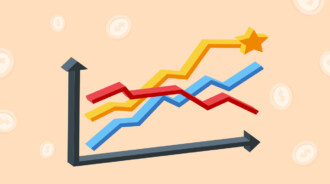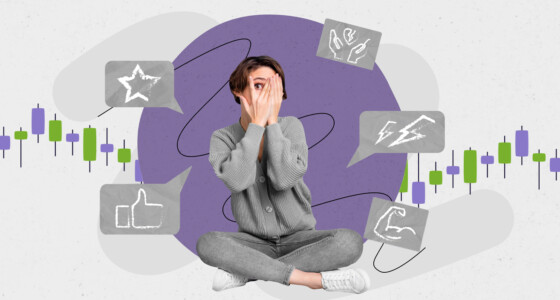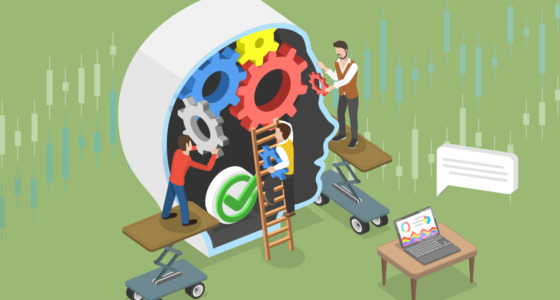

A trading simulator is an application downloaded instantly or a so-called demo account provided by a broker or a trading platform that allows users to place trades without risking their funds. Simulators resemble real market conditions, are funded with virtual funds, and are used for practicing trading strategies and technical tools.
Interestingly, simulating trading is also called paper trading. The term appeared in times when traders had to practice on paper. Keep reading to learn what simulators can be used for day trading.
Trading simulators: advantages
Trading simulators have indisputable benefits.
1. Real-time data
When implementing trading strategies and technical tools, you need to check whether they work. The first option is to backtest them on the historical data. You can check what signals an indicator or pattern gave and how the price behaved in the past.
This approach doesn’t allow you to understand the amount of funds you would risk or gain. Therefore, you need real-time data. While such tests on a real account may drain your funds, day trading simulators won’t allow you to risk your actual capital.
2. Practicing
When applying a new strategy or indicator or when entering a new market, you should be familiar with its unique features. Some strategies work for long-term trades only, while others suit short-term approaches. For instance, when trading on low timeframes, you need to be sure the tools you choose work in markets with increased volatility. Only by practicing can you evaluate how effective the tool is.
3. Experience
When trading with a simulator, you can quickly gain experience in spotting market setups. Demo trading allows you to open numerous trades. Therefore, you can test various approaches in multiple markets within a short period. As a result, you get better at catching trading signals.
4. Getting familiar with the trading platform
Although trading platforms are mainly similar, you should know how to execute trades, how to place stop-loss and take-profit orders, and where to find technical tools. Most brokers and trading platforms provide a demo account that includes all the tools, indicators, and financial instruments that are available on a real account. As day trades are made within a short-term period, a demo account will teach you how to behave in rapidly changing conditions.
Trading simulators: pitfalls
Like any other thing in this world, day trading simulators have disadvantages.
1. Inability to measure real risks
People care only about the things they own. When using fake funds, you can’t properly evaluate how much you would lose. So, when you get virtual money, there is a risk you won’t apply capital management properly.
2. Excluded emotions
Beginner traders don’t know how to control emotions. They vary from greed to fear of loss. When simulating trades, you won’t be able to experience real emotions because you neither lose nor gain real income.
How trading simulators work
Trading simulators are computer-based programs that allow you to carry out trading activities, without investing real money in real stocks. To put it simply, they work as training programs for people that are just starting with trading.
These trading simulators are made to mimic the stock market and offer traders a demo account where they can learn the ropes. They will receive an amount of virtual money that they can use to practice trades before they begin investing real money.
Trading simulators aim to offer trading experience and give people the confidence to take risks. As they work as a sort of “virtual reality” to the trading world, people can develop a strategy without the fear of losing money.

Benefits of using a trading simulator
There are several benefits to using a trading simulator, including the following:
1. It works your skills
With a good trading simulator, you will be able to hone your skills and develop good trading habits without actually putting your money at risk. It helps you figure out what the most calculated moves are for a trader in your position, significantly improving your strategy.
2. It reduces emotional trauma
When you trade with a real account from the very beginning, you may experience losses so big, you are afraid to go back in there. After all, you lost money. By using a trading simulator, you will at least know you did not lose money and this can prevent emotional trauma.
3. It improves reaction speed
As a beginner trader, you may not have an eye formed enough to see good opportunities. As a result, they may pass you before you are even able to notice them. With the training you will receive from a trading simulator, you will train your eyes to spot trades quicker. This will significantly improve your reaction time and increase earnings.
What to look for when choosing a trading simulator
When choosing a trading simulator, make sure that it meets the following requirements:
- · It mimics the stock market closely, allowing you to perform realistic trades
- · It has useful research tools and stock charts for you to learn from
- · It has multiple assets aside from stocks to practice with, such as mutual funds and ETFs
- · It has hotkeys, which allow aspiring traders to customize their trading strategy
Before you decide on a trading simulator, make sure that you conduct thorough research on the program you are considering.
Best trading simulators
There are different simulators regarding the market they are used for, cost, and installation method. Platforms mainly provide stock trading simulators. However, usually, one simulator can be used for various assets.
Fee simulators
- Warrior Trading. Warrior Trading is a product of NYSE and NASDAQ. It allows users to practice trading on US equities and options markets. To start, you will get $200,000 in virtual funds and access to advanced reporting metrics so you can track your performance. The simulator isn’t free, but you can get $100 off with a promotion code.
- Pilot Trading. Pilot Trading is a financial platform that allows active traders to practice trading strategies, use its algorithmic trading signals, and choose from a long list of brokers and trading platforms when they are ready to enter the real market.
Free day trading simulators online
- Wall Street Survivor. Wall Street Survivor is a platform that educates traders on how to reach an efficient financial lifestyle. It provides a demo account with a virtual $100,000 for stock market trading. Aside from free trading, you can use free courses.
- TradingView. TradingView is a well-known platform with real-time quotes from various exchanges, a wide range of technical indicators, and numerous financial instruments. You can simulate trades and backtest your strategies. The simulated trading is available for free. To increase the number of opportunities, you should subscribe to a certain plan.
- Investopedia. With the Investopedia simulator, you can trade more than 6,000 equities on the NYSE and the Nasdaq. You can practice by yourself or compete for the top rank with hundreds of thousands of other investors.
Takeaway
Simulators are crucial no matter what market you trade on. When choosing a simulator, you should consider what assets you trade. However, it’s not important what trading approach you use. You can test any trading strategy, including intraday trading, on simulators.









